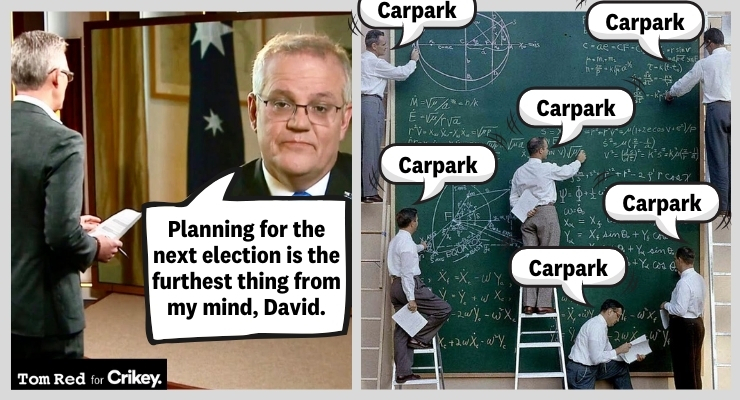
Josh Frydenberg has been busy. Yesterday the treasurer did nine media appearances, making it a grand total of 24 over the last week.
Each time, Frydenberg returned to the same soundbite: if not at 70 or 80% vaccinated, when?
“If we don’t open up at 70, 80%, [insert name of host], when do we open up? When do kids go back to school? When do businesses reopen? When will we be able to go and celebrate weddings or attend funerals of loved ones? When do we move freely in our own country? People need hope, and the plan is that hope.”
At a press conference this morning, Prime Minister Scott Morrison, who has returned to that rhetorical question several times, heralded “another day of hope”.
Expect to hear this a lot more. It’s the clearest sign that after months of floundering, the Coalition has sharpened its messaging and is ready for the polls. With most of the country stuck in lockdowns that are, in large part, a result of the federal government’s shocking failures on the vaccine rollout, the promise of freedom is the strongest electoral asset the Coalition has left.
As we wrote this week, a manufactured political battle between freedom and lockdowns is a cynical bit of framing on the part of the government. But it might well work.
Firstly, the electorate is getting pretty sick and tired of lockdowns and want them to end once the Doherty modelling targets are lifted. Two polls published this week suggest as much.
Given that, it makes sense to paint Labor as the party of lockdowns. By posing a rhetorical question — if not at 70-80%, when? — it shifts the burden onto Anthony Albanese to tell us when he would open up.
Crucially, the federal opposition have said several times that they support the targets in the Doherty report. But what Labor actually supports doesn’t really matter. All the government needs to do is create a perception they don’t back the plan and want to keep you in lockdown forever, just like they created a (false) perception that Labor wanted to tax retirees into poverty and put all miners on the dole in 2019.
Combine this message with doubts about reopening posed by Queensland and Western Australian premiers, and there’s enough to give the narrative legs.
Secondly, the government’s aggressive new framing draws a sharper contrast with Labor. For the last few months, as the government seemed lost, Labor have repeated, ad nauseum, the line that Scott Morrison had two jobs: the vaccine rollout and fixing hotel quarantine.
This is Morrison and Frydenberg’s attempt to neutralise that backward-looking message (notably, the prime minister finally lost it at Labor’s “two jobs” line in question time this week).
While the government talks about an end to lockdowns and a normal future, Labor are still asking why there are no desert quarantine camps. Now that there’s a genuine sense the rollout is finally hitting its stride (no credit to Morrison for this), the government is banking on people looking to the future, instead of a past where they couldn’t be bothered diversifying vaccine supply.
Will the voters really buy it? On one hand, hope is a pretty potent and compelling thing right now. On the other, it’s only potent and compelling because the Morrison government’s colossal botching of the vaccine rollout put us here in the first place. Nobody should count on the electorate remembering this. It took just a few weeks of Morrison cosplaying as a regular suburban dad for voters to forget six years of dysfunction in Canberra.
Still, there’s another problem with hope. At some point, the future arrives, and those hopes can be crushed. The reality is the next six months will be incredibly messy. We don’t know whether the hot-vaxxed summer the government is relying on will be accompanied by devastation in our hospitals. We don’t know how long state premiers will continue to chart their own course and keep borders shut. We don’t know just how badly this will affect kids.
If the future could get worse, it makes sense to hammer a message of hope. And if you’re feeling hopeful, maybe you head to the polls before that hope can turn to dust.








Crikey is committed to hosting lively discussions. Help us keep the conversation useful, interesting and welcoming. We aim to publish comments quickly in the interest of promoting robust conversation, but we’re a small team and we deploy filters to protect against legal risk. Occasionally your comment may be held up while we review, but we’re working as fast as we can to keep the conversation rolling.
The Crikey comment section is members-only content. Please subscribe to leave a comment.
The Crikey comment section is members-only content. Please login to leave a comment.